

One Man’s Mission to Revive the Last Redwood Forests. Is this the end of forests as we've known them? Camille Stevens-Rumann never used to worry about seeing dead trees.

As a wildland firefighter in the American west, she encountered untold numbers killed in blazes she helped to extinguish. She knew fires are integral to forests in this part of the world; they prune out smaller trees, giving room to the rest and even help the seeds of some species to germinate. “We have largely operated under the assumption that forests are going to come back after fires,” Stevens-Rumann said. But starting in about 2013, she noticed something unsettling. In certain places, the trees were not returning. This shift – echoed across a warming world – is a distinct phenomenon from trees dying because of direct human intervention such as logging. In western North America, huge swaths of forested areas may become unsuitable for trees owing to climate change, say researchers.
The change isn’t unique to the US and Canada. “I watched that tree die,” he said, gesturing toward a 40ft-tall ponderosa pine. Where 2020's Record Heat Was Felt the Most. 2020 was effectively tied with 2016 for the hottest year on record, as global warming linked to greenhouse gas emissions showed no signs of letting up.

This analysis of global temperatures, by the NASA Goddard Institute for Space Studies and released Thursday, found that 2020 was slightly warmer than 2016. But the difference was insignificant, the institute’s director, Gavin Schmidt, said in an interview. “Effectively it’s a statistical tie,” he said. Other analyses issued Thursday, one by the National Oceanic and Atmospheric Administration and another by Berkeley Earth, an independent research group in California, found that 2020 was slightly cooler than 2016, as did one published last week by the Copernicus Climate Change Service in Europe. But the difference was small enough to not be statistically significant.
New documentary about Canada's boreal forest reveals how it's in trouble, director says. Russia Admits to ‘World’s Largest’ Arctic Oil Spill. Russian authorities said the fuel spill at an Arctic power station earlier in 2020 was the largest in world history, a top emergencies official said Thursday.
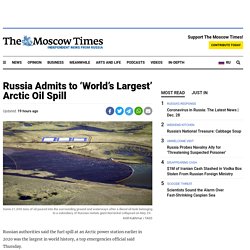
Some 21,000 tons of oil poured into the surrounding ground and waterways near the city of Norilsk after a diesel oil tank belonging to a subsidiary of Russian metals giant Nornickel collapsed on May 29. “Such an amount of liquid diesel fuel has never been spilled in the history of mankind,” the state-run RIA Novosti news agency quoted Deputy Emergency Minister Alexander Chupriyan as telling reporters. “We already trapped [the fuel] in the Arctic zone,” he said. A team of Nornickel-funded scientists, meanwhile, struck a more optimistic tone with their discovery of the five polluted rivers’ self-cleaning abilities, according to their final report cited by the state-run TASS news agency Wednesday. Extinction - the facts. They’re Among the World’s Oldest Living Things. The Climate Crisis Is Killing Them. Sequoia Crest, Calif. — Until a few years ago, about the only thing that killed an old-growth giant sequoia was old age.
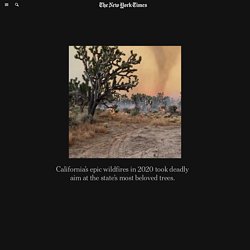
Not only are they the biggest of the world’s trees, by volume — the General Sherman Tree, considered the largest, is 36 feet in diameter at its base and 275 feet tall — they are among the oldest. At least one fallen giant sequoia was estimated to have been more than 3,200 years old. They last so long that, historically, only one or two of every thousand old-growth trees dies annually, according to Nate Stephenson, a research ecologist for the United States Geological Survey. Fire always was a frequent visitor to sequoia groves, but rarely a threat.
Mature sequoias are virtually fireproof because the bark can be several feet thick. Until now. Dr. “I could go, ‘Oh, there’s a fir needle, that’s incense cedar, that’s oak, that’s a pine,’” Dr. Intense fires engulfed the giant sequoia groves, killing trees.
Americans Will Pay Billions More For Climate Change, and That’s the Best Case. Photographer: The Washington Post/The Washington Post The Trump administration just published a major report documenting the advance of climate change, weeks earlier than expected and on a day many Americans are occupied with family and holiday shopping.
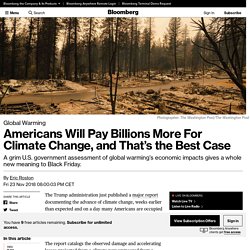
The news is predictably bad, but this time the tally comes with a pricetag—one significantly larger than you’ll find at the mall. The report catalogs the observed damage and accelerating losses projected from a climate now unmoored from a 12,000-year period of relative stability. Nearly Half of the U.S. Is in Drought. It May Get Worse. Nearly half of the continental United States is gripped by drought, government forecasters said Thursday, and conditions are expected to worsen this winter across much of the Southwest and South.
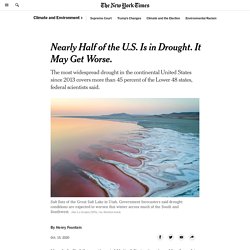
Mike Halpert, deputy director of the Climate Prediction Center, a part of the National Oceanic and Atmospheric Administration, said a lack of late-summer rain in the Southwest had expanded “extreme and exceptional” dry conditions from West Texas into Colorado and Utah, “with significant drought also prevailing westward through Nevada, Northern California and the Pacific Northwest.” Big Oil’s decades of deception: Report reveals that Exxon’s known the truth about climate science since 1981. While evaluating the potential impact of developing a gas field it was interested in off Indonesia, ExxonMobil found one major reason for concern: the field in question was 70 percent carbon dioxide.
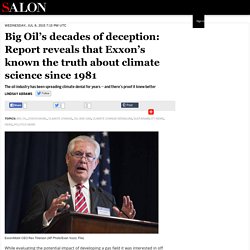
If the field were developed, and that gas vented into the atmosphere, it could become the “largest point source of CO2 in the world,” accounting for a full one percent of climate change-causing emissions. According to Leonard S. Bernstein, a former chemical engineer at the company, Exxon recognized the potential for global warming concerns to lead to regulations that would impact the project and others like it. The year was 1981. The World’s Largest Tropical Wetland Has Become an Inferno. This year, roughly a quarter of the vast Pantanal wetland in Brazil, one of the most biodiverse places on Earth, has burned in wildfires worsened by climate change.
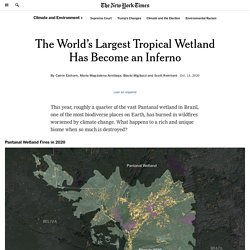
What happens to a rich and unique biome when so much is destroyed? Overlooked No More: Eunice Foote, Climate Scientist Lost to History. Overlooked is a series of obituaries about remarkable people whose deaths, beginning in 1851, went unreported in The Times.
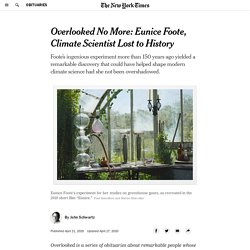
In the 1850s, Eunice Foote, an amateur scientist and activist for women’s rights, made a remarkable discovery about greenhouse gases that could have helped form the foundation of modern climate science. But the scientific paper she published that might have added her name to the pantheon of early climate scientists was quickly forgotten, and she faded into obscurity. There isn’t even a known photograph of her today. The idea that greenhouse gases warm the planet is anything but new, and anything but unsettled. Foote’s ingenious and elegant experiment involved two glass cylinders filled with various substances, including moist air and carbon dioxide. In her 1856 paper about the experiment, “Circumstances Affecting the Heat of the Sun’s Rays,” she wrote that a cylinder with moist air became warmer than one with dry air. Why did Foote’s work disappear for so long? In India, there's water everywhere, and nowhere.
Climate change: Oceans running out of oxygen as temperatures rise. Image copyright IUCN Climate change and nutrient pollution are driving the oxygen from our oceans, and threatening many species of fish.
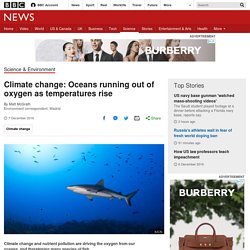
That's the conclusion of the biggest study of its kind, undertaken by conservation group IUCN. While nutrient run-off has been known for decades, researchers say that climate change is making the lack of oxygen worse. Around 700 ocean sites are now suffering from low oxygen, compared with 45 in the 1960s. Researchers say the depletion is threatening species including tuna, marlin and sharks. Amazon fires: Brazilian rainforest burning at record rate, space agency warns. Media playback is unsupported on your device Brazil's Amazon rainforest has seen a record number of fires this year, according to new data from the country's space research agency.
New research identifies Fukushima reactor material in environment. Through the analysis of specific fallout particles in the environment, a joint UK-Japan team of scientists has uncovered new insights into the sequence of events that led to the Fukushima nuclear accident in March 2011. The multi-organisation research, led by Dr. Peter Martin and Professor Tom Scott from the University of Bristol's South West Nuclear Hub in collaboration with scientists from Diamond Light Source, the UK's national synchrotron facility, and the Japan Atomic Energy Agency (JAEA), has been published today in the journal Nature Communications.
Like the Chernobyl accident of April 1986, the incident at the Fukushima Daiichi Nuclear Power Plant (FDNPP) has been classified by the International Atomic Energy Agency (IAEA) at Level 7 (the most-severe) of the International Nuclear Event Scale (INES) as a consequence of the large amount of radioactivity released into the environment. Dr. GAO: Climate change already costing US billions in losses. WASHINGTON (AP) — A non-partisan federal watchdog says climate change is already costing U.S. taxpayers billions of dollars each year, with those costs expected to rise as devastating storms, floods, wildfires and droughts become more frequent in the coming decades. A Government Accountability Office report released Monday said the federal government has spent more than $350 billion over the last decade on disaster assistance programs and losses from flood and crop insurance.
That tally does not include the massive toll from this year's wildfires and three major hurricanes, expected to be among the most costly in the nation's history. The Senate on Monday gave preliminary approval to a $36.5 billion hurricane relief package that would provide Puerto Rico with a much-needed infusion of cash and keep the federal flood insurance program from running out of money to pay claims from hurricanes Harvey, Irma and Maria. Indian City in Water Crisis as All Four Reservoirs Run Dry (PHOTOS) Chennai, India's sixth largest city, is in the midst of a water crisis as its four main reservoirs are completely dry. Deficient monsoon rains, as well as excessive groundwater pumping and an inefficient and wasteful water supply system are to blame for the arrival of "Day Zero," the name given to the day that the city ran out of water and taps were turned off.
The water shortage has forced the closure of schools, offices and businesses, and taps in homes have run dry. The crisis strikes as the country struggles with a heat wave that has taken dozens of lives. (MORE: Heat Wave Sears India) Himalayan glacier melting doubled since 2000, spy satellites show. Extinct Russian Volcano Has Woken up and Could Unleash 'Pompeii-size' Eruption, Scientists Warn. 'Single Most Important Stat on the Planet': Alarm as Atmospheric CO2 Soars to 'Legit Scary' Record High. India heatwave temperatures pass 50 Celsius. Date created : 01/06/2019 - 22:45 New Delhi (AFP) CO2 in the atmosphere just exceeded 415 parts per million for the first time in human history. Greenland is melting even faster than experts thought, study finds.
From ruined bridges to dirty air, EPA scientists price out the cost of climate change. 'Most Destructive Pathogen Ever' Has Created Zombie-Like Apocalypse for World's Amphibians. A terrifying new study details the havoc being wrought by what scientists call "the most destructive pathogen ever" recorded on earth, finding that with help from unwitting humans a "silent killer" has caused major declines of frogs, salamanders, and hundreds of other amphibian species.
Chytridiomycosis, or chytrid fungus, has killed off 90 species over the past 50 years while leading to huge losses of 501 kinds of frogs, toads, salamanders, and other amphibians, according to researchers from a number of worldwide universities. The End of the Line. African heatwaves could increase ‘five-fold’ with 3C of global warming. Non-survivable humid heatwaves for over 500 million people – Climate Guide.
Researchers at MIT warn that if climate change remains unchecked (Business As Usual-scenario = RCP 8.5) over half a billion people will, from 2070 onwards, experience humid heat waves that will kill even healthy people in the shade within 6 hours. The Uninhabitable Earth: David Wallace-Wells on the horrors of climate change.
Plummeting insect numbers 'threaten collapse of nature'. ‘The devastation of human life is in view’: what a burning world tells us about climate change. Bolsonaro Government Reveals Plan to Develop the ‘Unproductive Amazon’ As Workers Suffer From Shutdown, Groups Accuse Trump of 'Rolling Out the Red Carpet' for Oil and Gas Drilling. 60 Environmental Rules on the Way Out Under Trump. You're Not Allowed to Die Here. Climate change is shrinking winter snowpack, which harms Northeast forests year-round. Portrait of a planet on the verge of climate catastrophe. Climate change will bring multiple disasters at once, study warns. Bayer faces billion-dollar losses to deadly herbicide Roundup. Devastating climate change could lead to 1m migrants a year entering EU by 2100.
Why everything will collapse. Stop biodiversity loss or we could face our own extinction, warns UN. EPA Says Farmers Can Keep Using Weedkiller Blamed For Vast Crop Damage. A WILDERNESS “HORROR STORY” > Newsroom. 'We've never seen this': massive Canadian glaciers shrinking rapidly. Animal species becoming extinct in Haiti as deforestation nearly complete.
Scientists are terrified that Brazil's new president will destroy the 'lungs of the planet' Thousands of ships could dump pollutants at sea to avoid dirty fuel ban. Driven by Trump Policy Changes, Fracking Booms on Public Lands. An oil spill you've never heard of could become one of the biggest environmental disasters in the US - CNN. Climate Change & Greenhouse Effect. 60,000 tons of dangerous radioactive waste sits on Great Lakes shores. Satellite images show 'runaway' expansion of coal power in China. Time Bomb: How Atmos Energy’s natural gas keeps blowing up Texas homes. First North Carolina Got a Hurricane. Then a Pig Poop Flood. Now It’s a Coal Ash Crisis. 88,000 tons of radioactive waste – and nowhere to put it. Losing Earth: The Decade We Almost Stopped Climate Change.
Temperature. Climate change: Our plans are in pieces as killer heat shreds records. The Wagon Wheel Project. Europe Drought: Farmers warn hot weather will affect harvest. 'We have different ways of coping': the global heatwave from Beijing to Bukhara. The DoE May Bail Out Failing Coal Plants in the Name of National Security. 'It’s wrong to stink up other people’s lives': fighting the manure lagoons of North Carolina. A rare great ape, a 130-foot-tall tree and an extinct marsupial lion make the Top 10 New Species list for 2018. Kilauea Volcano Lava Reaches Ocean, Creating New Danger in Hawaii. Plastic Pollution Reaches Mariana Trench, Deepest Part of Ocean.
Foaming Polluted Lake Catches Fire. River in Russia Clogged by Vast Numbers of Plastic Bottles. Ecosystems. Plastic Pollution. The Horrendous Way Fish are Captured for Your Aquarium—With Cyanide. Npr. Flow: For Love of Water (Full Documentary) "Flow" Trailer (Who owns the worlds water supply!?) Middle East Runs Out Of Water. Pine Island and Thwaites glaciers will determine sea level rise. Plastic Is Everywhere And Recycling Isn't The End Of It.
Earth Overshoot Day. Millions of asteroids flying near the Earth? If yes, are we in danger click 2x. Beyond our oceans: Microplastics pollute rivers and lakes too. Overpopulation, overconsumption – in pictures. Sperm whale washed up on Spanish coast was killed by plastic pollution. World’s great forests could lose half of all wildlife as planet warms – report. Ghana's Illegal Galamsey Gold Mining Affecting Cocoa Farmers, Chocolate Supply. Our Warming World: The Future of Climate Change [INFOGRAPHIC]
Warning Bells about Fracking and Earthquakes Growing Louder. Deadly Winter Storm Riley Hammers Mid-Atlantic, Northeast (PHOTOS) Arctic temperatures soar 45 degrees above normal, flooded by extremely mild air on all sides. How nuclear weapons research revealed new climate threats. The Year Climate Change Began to Spin Out of Control. MI: Energy department adviser assures US coal industry he's 'here to help' On its hundredth birthday in 1959, Edward Teller warned the oil industry about global warming.
Lake in Africa Could Release Deadly CO2. Could climate change transform Earth into Venus? [Infographic] Alarm over decline in flying insects. Global pollution is the world's biggest killer, threat to mankind's survival. More than 75 percent decline over 27 years in total flying insect biomass in protected areas.